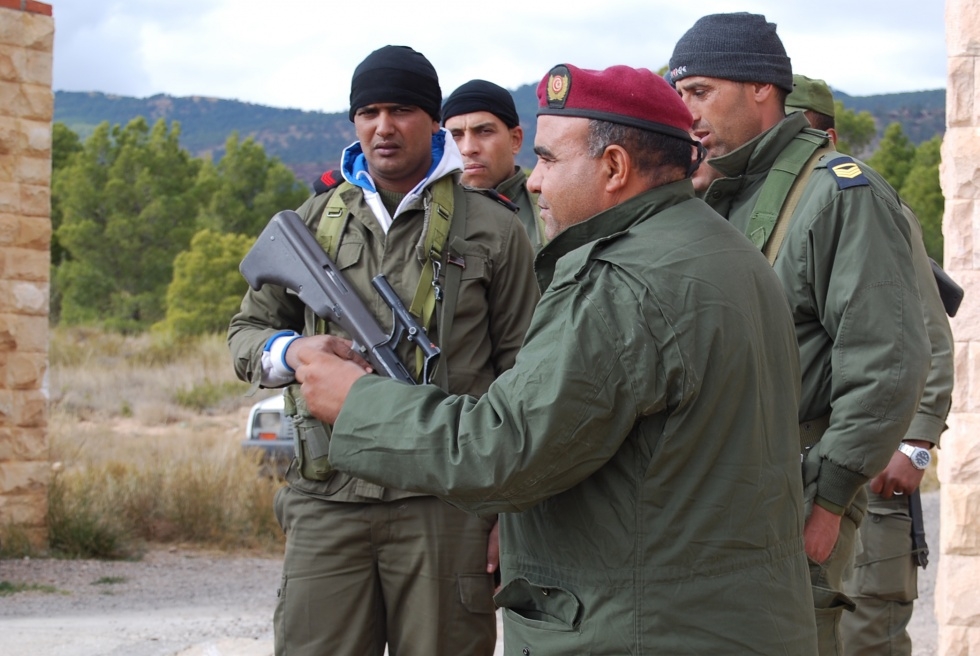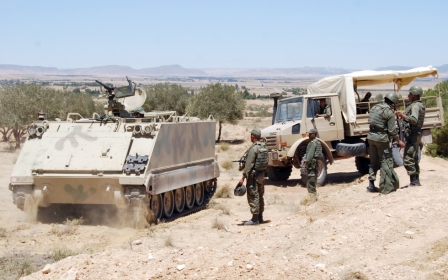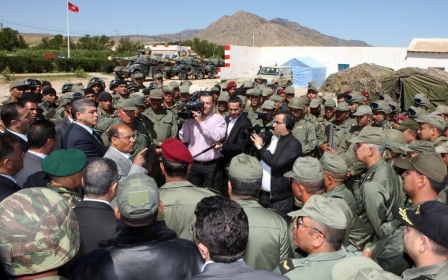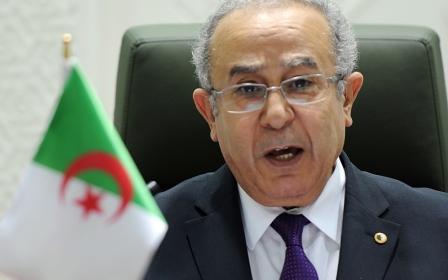Six Tunisian security forces wounded in bomb blast

Six members of the Tunisian security forces were wounded when a roadside bomb exploded Tuesday in the mountainous Kef region near the Algerian border, the interior ministry said in a statement.
"A roadside bomb exploded as a military vehicle passed by, wounding four soldiers and two members of the National Guard," the statement said.
At the time, the security forces were combing the mountains in the provinces of Kef and neighbouring Jendouba "where the remnants of a terrorist group is holed up," the ministry added.
Tunisia is one of the most stable North African states but does experience sporadic bursts of violence and militant activity.
“Although the incident is not unique, as there have been several incidents on the Tunisian-Algerian borders, we are wary of these attacks increasing during Ramadan," Tarek Al-Kahlaoui, director of the Tunisian Institute for Strategic Studies, told the Middle East Eye.
“These bombs were probably planted by terrorist groups linked to the Salafi jihadists in Tunisia. They believe these attacks are jihad and may therefore increase their activity during the holy month,” added Kahlaoui.
A policeman was wounded in a similar blast Sunday while earlier this month Al-Qaeda in the Islamic Maghreb (AQIM) for the first time claimed responsibility for a 27 May attack on the interior minister's residnece. The minister, Lotfi Ben Jeddou, was unharmed but killing four policemen were killed in the attack which took place in the western Kasserine region.
Militant activity
Since late 2012, Tunisian security forces have been battling fighters operating in the region close to the Algerian border, many of whom are suspected of having links to militant groups and al-Qaeda-influenced fighters.
More than 20 policemen and army troops have been killed in the area, many by improvised bombs and mines, since the beginning of the unrest.
In August 2013, areas along Tunisia’s borders with Algeria and Libya were declared closed military zones, after nine Tunisian soldiers were killed in an ambush on Mount Chaambi in southern Tunisia.
Tunisian authorities say they have since gained the upper hand in the fight against militants active along the Algerian border, while admitting that the campaign to root out all the militants will take time.
Tunisia has also been wary of the growing influence of militant groups in neighbouring countries around the region.
According to Kahlaoui, most of the attacks on security forces taking place in Tunisia, are linked to members of Ansar al-Sharia. While most militants in Tunisia are believed to be members of this group, there seems to be a close link between the more extreme wing of Ansar al-Sharia and AQIM, a jihadist group that is more commonly associated Algeria. Ansar al-Sharia in Tunisia may also have loose links to other branches of the group across North Africa and other parts of the Middle East.
However, recent developments in Iraq, have seen the group apparently shift its attention eastward toward Iraq and Syria where the Islamic State (IS) has been making sweeping gains in recent weeks.
The head of Ansar al-Sharia in Tunisia, Abu Iyad al Tunisi, released a statement calling for reconciliation between the Islamic State of Iraq and the Levant (ISIL) now the Islamic State on 13 June. The statement was published on the group's Twitter feed.
“Similar to the situation in Syria, Tunisian Salafi jihadists are divided in their support between the al-Nusra Front and the Islamic State (IS). There is a tendency however among many Tunisian Salafi jihadists to support IS,” said Kahlaoui.
IS announced on Sunday the establishment of a caliphate, an Islamic form of government last seen under the Ottoman Empire, extending across territory under their control from Aleppo in northern Syria to Diyala in Iraq.
New MEE newsletter: Jerusalem Dispatch
Sign up to get the latest insights and analysis on Israel-Palestine, alongside Turkey Unpacked and other MEE newsletters
Middle East Eye delivers independent and unrivalled coverage and analysis of the Middle East, North Africa and beyond. To learn more about republishing this content and the associated fees, please fill out this form. More about MEE can be found here.




